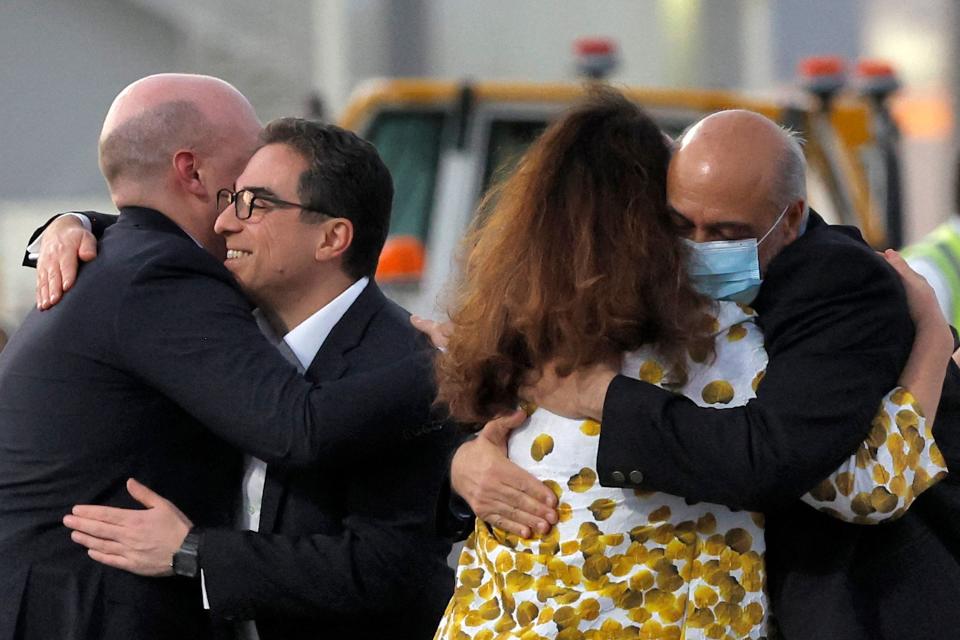Americans are freed from Iran. So, why is the prisoner swap controversial for Biden?
- Oops!Something went wrong.Please try again later.
- Oops!Something went wrong.Please try again later.
- Oops!Something went wrong.Please try again later.
- Oops!Something went wrong.Please try again later.
WASHINGTON – President Joe Biden is facing heat over his decision to go through with a controversial prisoner exchange between the U.S. and Iran.
The deal could pave the way for better relations with the bitter adversary. But it's also put Biden at further odds with congressional Republicans and provided new fodder for his presidential rivals.
At issue: the release of $6 billion in frozen assets.
Republicans have equated the swap with Iran to the administration paying out a ransom for the freed Americans.
America has a policy of not paying ransoms, and they say Biden's administration cannot guarantee that the money will not be used to fund Iran's nuclear and ballistic missile programs, Russia's war against Ukraine, or terrorism. Biden's critics are also warning the policy could lead to the unjust arrest and detention of more Americans.

Prisoner exchange rewards Tehran for imprisoning Americans, Biden's critics say
The number of Americans who are being held hostage or are wrongfully detained abroad is unknown. The James W. Foley Legacy Foundation is tracking 55 publicly disclosed cases. While terrorist kidnappings have declined in recent years, the organization found foreign governments have been increasingly wrongfully detaining U.S. citizens for more than a decade.
House Foreign Affairs Chairman Michael McCaul, R-Texas, said he was very concerned the $6 billion will incentivize hostage-taking in the future.
"Even though the Administration claims these funds are limited to humanitarian transactions, we all know that transactions are difficult to monitor and that money is fungible," McCaul said in a Monday statement. "There is no question this deal will free up funds for Iran’s malign activities."
The Biden administration is insisting that the funds, which came from Iranian oil revenues parked in overseas bank accounts, can only be used for humanitarian purposes.
Nevertheless, Republicans are not confident the money will be used for purchasing food and medicines. Critics were further incensed after Iranian President Ebrahim Raisi said his government would determine what constituted humanitarian aid.
"Humanitarian means whatever the Iranian people need," Raisi told NBC News.
In an interview with USA TODAY ahead of the prisoner swap, U.S. Ambassador to the U.N. Linda Thomas-Greenfield said the U.S. has been “categoric” that it will control how the funds are used. “They will be for humanitarian purposes. I have no doubt,” Thomas-Greenfield said.
Republicans push for 'maximum pressure'
President Donald Trump withdrew the U.S. from the nuclear deal that the Obama administration entered into with Europe in 2015. The former president also reimposed stiff sanctions on Iran.
Republicans generally support the use of sticks rather than carrots when it comes to Iran and argue that deals like the one Biden brokered project weakness.
In social media posts, parts of which were in all caps, Trump argued Monday that Biden was setting a "terrible precedent" and "once you pay, you always pay, & many more hostages will be taken."
Backers of Biden's deal see the return this week of the five Americans as evidence that the previous administration's maximum pressure campaign on Iran was not constructive and that Biden's policy of pairing of diplomatic negotiations with sanctions is more likely to produce better cooperation from Tehran.
Seyed Mohammad Marandi, an adviser to Iran's government on nuclear and foreign policy issues, said in a brief WhatsApp message that the prisoner exchange represented an "opportunity for the U.S." to cooperate further with Iran in other areas. However, Marandi said that from Iran's perspective "it's unclear if team Biden has the political will to use this opportunity."
Biden's foreign policy toward America's enemies hinges on establishing open lines of communication to avoid misunderstandings. But he is running for reelection and cannot afford to lose support from swing voters who cast their ballots for him and against Trump in the last election.
Siamak Namazi, one of the Americans released, encouraged Biden on Monday to use the bully pulpit from the United Nations this week to prevent hostage-taking from happening in the first place.
"It is only if the free world finally agrees to collectively impose draconian consequences on those who use human lives as mere bargaining chips, that the Iranian regime and its ilk will be compelled to make different choices," Namazi said in a statement. "Sadly, until then, we can anticipate more Americans and others falling victim to state hostage-taking – a horror that, thanks to you, my family and I will strive to put behind us starting today.
New source of Biden criticism
Biden was already clashing with congressional Republicans over Ukraine and the slow pace of the counteroffensive.
The administration is in a standoff with Republicans in the House over $20.6 billion in funding for Ukraine it asked for over the summer. The money is intended to support Ukraine's military and humanitarian efforts through the end of the calendar year. With the fiscal year coming to a close at the end of September, however, the U.S. government could be headed for a shutdown fueled in part by disputes over the request.
Republicans in Congress are divided over whether it is a vital U.S. interest to keep funding the war. And even among those who do support the aid, Biden has come under criticism for refusing to provide Kyiv with long-range weapons sooner.
In a United Nations speech on Tuesday, the U.S. president will again press for global support for the war before returning to Washington to meet with Ukrainian President Volodymyr Zelenskyy at the White House on Thursday.
Contributing: Kim Hjelmgaard
This article originally appeared on USA TODAY: Americans are freed from Iran. Why Biden prisoner swap draws criticism.

